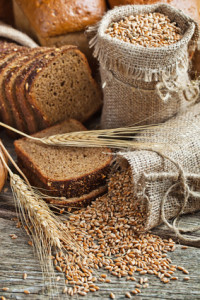There is certainly a lot of hype about gluten-free diets. In terms of diet trends assessed by Google, “gluten-free diet” searches have risen dramatically over the last 10 years. Gluten-free/grain-free diet books remain bestsellers. And along with the interest is a multi-million dollar industry catering to the growing demand for gluten-free products.
But will going gluten-free benefit your health?
What Is a Gluten-Free Diet?
Gluten-free diets avoid any foods or food items containing gluten, a mixture of proteins found in wheat, barley, and rye. Individuals with celiac disease (about 1% of the population) need to absolutely avoid gluten because it damages their intestines. A poorly understood condition called non-celiac gluten sensitivity (NCGS) may exist in some individuals, but this is a debatable condition that recent studies have called into question.
The Claims
Proponents of gluten-free diets claim that avoiding gluten will improve overall health, help you lose weight, improve athletic performance, and “cure” a laundry list of medical conditions including digestive problems, skin conditions, depression, anxiety, autism, and much more. For example, in his book Grain Brain, David Perlmutter claims that a gluten-free diet can cure 38 different diseases and symptoms; you’ll find Wheat Belly author William Davis’ very long list of conditions caused by consuming wheat, or treated by removing wheat here.
Feeling better on a gluten-free diet?
It may have nothing to do with gluten

If a person notices health benefits after eliminating gluten, they will attribute the benefit to going gluten free. But it’s almost impossible to attribute any benefits to the absence of gluten, unless you conduct a carefully controlled and blinded experiment. Restricting gluten can impact many other dietary variables that influence health (for example overall calories, diet quality, carbohydrate quality, ratio of fat/carbohydrates/protein, fiber intake).
Most gluten-free diets recommend limiting processed foods and refined carbohydrates and eating more fruits and vegetables, habits that can improve diet and health tremendously.
Also, when people pay more attention to food labels and are more aware of what they are eating, they tend to eat more healthfully overall, which benefits health. Paying attention to what you’re eating can also help weight loss efforts, and losing weight can lead to a host of health benefits unrelated to gluten.
Potential downsides of a gluten-free diet
A gluten-free diet that relies heavily on commercial products might be lacking on the nutrition front. It can also be expensive, and many gluten-free foods aren’t fortified with iron or folic acid. Also, when manufacturers remove gluten from foods they may add additional sugars, sodium, and unhealthy fats. Many gluten-free products use a refined gluten-free flour that lacks the fiber of other grains. Consumer Reports provides several examples of gluten-free foods that are unhealthier than their gluten-containing counterparts (see their report for specific examples).
Evidence is emerging that eliminating gluten can had adverse health effects. One preliminary study suggests that a gluten-free diet may decrease the count of beneficial gut bacteria. Also, this research found that people avoiding grains and gluten are at higher risk for heart disease. Another study suggests that those who consume too many rice-based products (popular gluten-free foods) may be at risk for harmful levels of arsenic and mercury exposure.
Also, gluten-free diets tend to be low in carbohydrates, which might not be an ideal eating style for most people, namely endurance athletes who need additional carbohydrates to fuel their body for workouts.
The Evidence
While gluten can cause problems in a minority of the population, there is no good evidence that gluten is problematic for most people. Many individuals are getting their information from popular anti-grain or anti-wheat books (for example, Wheat Belly, Grain Brain), which are not based in good science and have been widely criticized by most academics and nutrition experts. For example, here is how McGill’s Joe Schwarcz describes the lack of science behind Wheat Belly:
“But if you are scientific minded, it is worthwhile to read this book just to see how masterfully Davis blends cherry-picked data, inflammatory hyperbole, misused science, irrelevant references and opinion masquerading as fact into a recipe for a cure-all. Some of the “science” is just absurd.”
Non-celiac gluten sensitivity questioned. Experts question the existence of gluten sensitivity in non-celiac individuals. A recent study followed 392 patients complaining of gluten-related symptoms for 2 years. Researchers concluded that self-perceived gluten-related symptoms are rarely indicative of the presence of non-celiac gluten sensitivity, finding that 86% of patients who thought they were sensitive to gluten did not have celiac disease, a wheat allergy, or non-celiac gluten sensitivity. This study corroborates other research showing that the vast majority of people who think they’re sensitive to gluten aren’t.
 In terms of athletic performance, there is no evidence to support a gluten-free diet. A study in competitive cyclists used a controlled randomized double-blind, cross-over design to examine the influence of gluten. Investigators found that a gluten-containing diet did not influence performance in a 15 km time trial, GI symptoms, well-being, and other inflammatory markers or indicators of intestinal injury in non-celiac endurance athletes. You can read more about the evidence for athletes avoiding gluten and grains here.
In terms of athletic performance, there is no evidence to support a gluten-free diet. A study in competitive cyclists used a controlled randomized double-blind, cross-over design to examine the influence of gluten. Investigators found that a gluten-containing diet did not influence performance in a 15 km time trial, GI symptoms, well-being, and other inflammatory markers or indicators of intestinal injury in non-celiac endurance athletes. You can read more about the evidence for athletes avoiding gluten and grains here.
Bottom Line
 Beyond the 1% percent of North Americans have celiac disease who need to strictly avoid gluten, scientific evidence that a gluten-free diet will benefit others is lacking. A gluten-free diet is beneficial if it means that individuals start replace gluten-containing grains with vegetables and fruits and avoid processed foods.
Beyond the 1% percent of North Americans have celiac disease who need to strictly avoid gluten, scientific evidence that a gluten-free diet will benefit others is lacking. A gluten-free diet is beneficial if it means that individuals start replace gluten-containing grains with vegetables and fruits and avoid processed foods.
If you feel better after eliminating gluten, your new healthy habits likely don’t need to be at the expense of limiting a wide array of foods with known health-promoting properties.
There is little evidence that avoiding gluten or wheat will improve your health. In fact, whole grains have many health benefits and gluten-containing grains are an integral component of some of the best-studied and healthiest diets in the World.
More reading about gluten-free diets and health:
- Gluten avoidance and cardiac risks (New England Journal of Medicine, Podcast).
- Long term gluten consumption in adults without celiac disease and risk of coronary heart disease: prospective cohort study (British Medical Journal, 2017; 357)
- Gluten-free foods may not be healthful, study warns (Medical News Today, reporting on 50th Annual Congress of the European Society for Paediatric Gastroenterology Hepatology and Nutrition, 2017)
- You Shouldn’t Go Gluten-Free Unless You Have Celiac Disease, According to a Study (NY Mag, reporting on BMJ 2017;357:j1892)
- Gluten-free diet may increase risk of arsenic, mercury exposure (Science Daily, reporting on The Unintended Consequences of a Gluten-Free Diet. Epidemiology, 2017; 1)
- Gluten-free diet won’t help athletic performance. This study in competitive cyclists used a controlled randomized double-blind, cross-over design to examine the influence of gluten (athletes didn’t know if their 7-day study diet contained gluten or not). Investigators found that a gluten-containing diet did not influence performance (15 km TT), GI symptoms, well-being, and a other inflammatory markers or indicators of intestinal injury in non-celiac endurance athletes. (Med Sci Sports Exerc. 2015 May 12. )
- Gluten sensitivity: new epidemic or new myth? (Nash DT, Slutzky AR. Baylor University. Medical Center; 2014;27(4):377-378.)
- Hidden risks of going gluten free for health (Consumer Reports)
- Against the Grain (Micheal Specter, the New Yorker)
- Gluten free may not improve athletes’ performance (video, study by University of Tasmania, Australia researchers)
- Experts Question Benefits of Gluten-Free for All but a Small Minority (Wall Street Journal)
- Gluten elimination diets: Facts for patients on this food fad (Kathleen Cadenhead, MD, Margo Sweeny, MD, BC Medical Journal)
- Grain Brain – Take It With a Grain of Salt (Axel F. Sigurdsson MD, PhD, FACC).
- Dissecting the Myth: Why Grains and Gluten Aren’t Bad for You
- When a gluten-free diet is *bad* for you (Berkeley Wellness)
- Is gluten-free healthier? (Jill Parnell, PHD)
- The dangers of going gluten free
- Gluten-free diets: who’s spreading the bulldust? (Bill Shrapnel, MHP)
- The facts about gluten and gluten intolerance. (Science-Based Medicine)
- McGill’s Joe Scwarcz reviews Wheat Belly (Joe Schwartz, PhD)
- Is wheat bad for you? Not for most people. (Marion Nestle, MPH, PhD, Food Politics Blog)
- Ignore Grain Brain & Wheat Belly: Eat WHOLE Grains (Dr. Gabe Mirkin)
- Beating on Wheat and Raining on Grains (Dr. David L. Katz)
- Is modern wheat making us sick? (Monica Reinagle, RD)
- Evidence-based review of the popular diet book Wheat Belly (Julie Jones, PhD)
- Does wheat make us fat and sick? (European Food Information Council)
- The 10 best wheat and gluten-free carbohydrate foods if you train a lot (Lisa Middleton, RD)
Reviewed and updated June 14, 2017
More in the Healthy or Hype Series
- Healthy or Hype? Almond Milk
- Healthy or Hype? Agave Syrup
- Healthy or Hype? Buttered/Bulletproof Coffee
- Healthy or Hype? Veggie Chips
- Healthy or Hype? Chocolate Milk for Recovery
- Healthy or Hype? Coconut Oil
- Healthy or Hype? Protein Powder
- Healthy or Hype? “Natural” Sweeteners
- Healthy or Hype? Turmeric
Share This:
